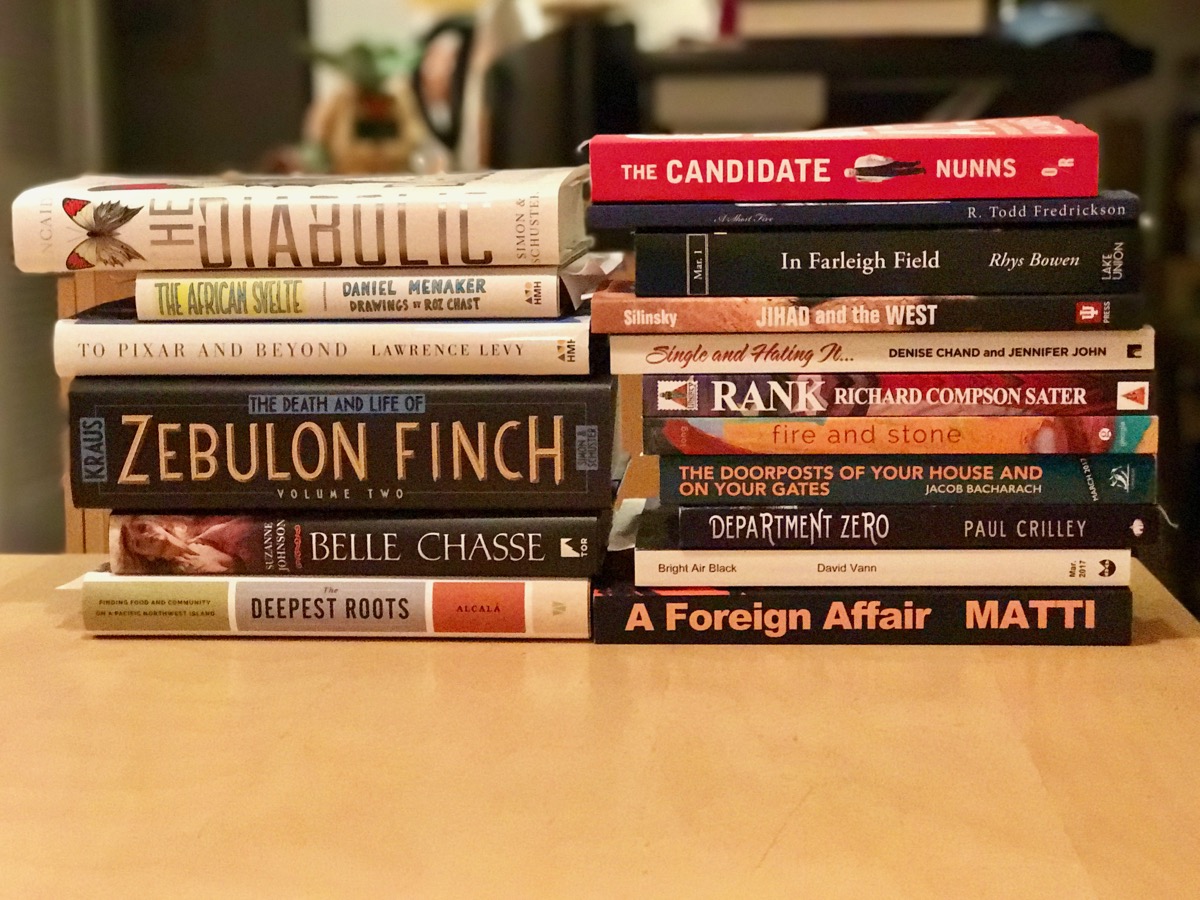The Sunday Post for November 6, 2016
Elena Ferrante, Private Novelist
Alexander Chee on Elena Ferrante's upcoming new book.
The bar for every writer of fiction is that the novel is an invented thing. And yet each time we write, novelists are treated like spiritualists who rip off the grief-stricken — as though our inventions are some sort of hustle. Surely you must have some experience like this: Tell us about it. On tour for my first novel, a reader asked, “How much of this is autobiographical?” I replied, nearly snarling, “If you knew, would you believe it more or less?”
A Militia Gets Battle Ready for a ‘Gun-Grabbing’ Clinton Presidency
No amount of not taking guns away will convince some people that nobody's coming to take their guns away. But even if you believe the 3% belief — mistakenly thinking that only 3% of the population of the United States fought the Revolutionary War (with a population of 2.5 million in the colonies, and about 145,000 joining in militias, and 231,000 in the Continental Army — although those totals span the war and no individual battle saw near those numbers — it was more like 15%) — you would have to be close to 9.5 million to take the same action now. Finding 9.5 million Americans to take up arms, especially in times of relative prosperity, based on conspiracy theories is a tall order.
But of course, these men, like other "patriots", believe what they want irregardless of the weighty evidence that they are wrong, historically, and about the current political climate. Patriotism is a faith and a dogma, and the symbol of their sect is crossed firearms.
For example. let us consider the figure of Mr. Devin Bowen:
This session was held on 14 acres owned by Devin Bowen, a machinist who was having a miserable day even before the deputies forced him to drop his pistol.
The door of his trailer — the one with a sign that reads, “If You Don’t Live Here, Don’t Come Here” — was smashed in that day. Three rifles, a crossbow, 13,000 rounds of ammunition and an 800-pound gun safe were taken — not by federal agents, but by local thieves. Worse, Mr. Bowen was coughing up blood from an unknown malady. He soothed his throat by chugging cold Coca-Colas.
Mr. Bowen’s comrades urged him to see a doctor, prompting a sour discussion about yet another conspiracy they see: the Affordable Care Act. Mr. Bowen waved them off. He was more concerned about Muslim immigrants’ imposing Shariah law. “You cannot come to my country and shove your religion down my throat,” he said, coughing.
How Georgia's Voter-Fraud Fight Could make This Grandmother a Felon
In a world where the GOP candidate hires firms with workers literally convicted of voter fraud and appeals (successfully) a court choice that his campaign cannot intimidate voters, and where a GOP state chair accuses polls of only staying open late so that "certain people" can vote, it's maddening to see the racist, classicist, and anti-democratic local Republican leadership so nakedly try to squash minority votes. There is no other way: all Americans who believe in Democracy should vigorously support as many people voting as possible. It's ludicrous to suggest otherwise.
Olivia Pearson, known around town as Miss Libby, surged with pride when she ferried her 18-year-old nephew to the polls to cast his first-ever ballot for Barack Obama in 2012. But now the former parole officer, civil rights activist, and grandmother has been charged with improperly helping him to vote. If convicted, she faces up to five years in prison.
Her prosecution is one skirmish in the intense and increasingly bitter nationwide struggle between Democrats’ efforts to mobilize voters — especially people of color — and Republicans’ attempts to crack down on what they say is voter fraud in an election that Trump has repeatedly claimed is “rigged.” Her case comes amid the pitched electoral battle for the state of Georgia, long a rock-solid Republican bastion where polls show Donald Trump holds only a slim lead over Hillary Clinton. Republican officials in Georgia have encouraged ordinary citizens to lodge voter-fraud complaints through, for example, a dedicated website. Prosecutions remain rare but, critics charge, can send a message so chilling it suppresses voter turnout.
How Do You Get David Duke to Leave Your Party?
What do you do when David Duke shows up to your party and you want to get rid of him, but can't?
A few stalls and many crowds of drunk people across the grounds, Theresa Crosby, Deutsches Haus' executive director, sat behind a raffle booth, wearing a dirndl and ruffled bloomers. "He has been here uninvited," she told me. "He was told that he cannot hand out anything political, and he could not ask people to wear stickers and things like that." For emphasis, she ran down the list of her rules for all political figures, but most of all for this particular 66-year old candidate for the United States Senate: "You cannot pass out any literature, you cannot put any stickers on people, you cannot hold court, you cannot make any announcements. If you go around and people come up to you, that's fine, but you cannot go around and harass our people."
The Essential W.S. Merwin - Kickstarter Fund Project #44
Every week, the Seattle Review of Books backs a Kickstarter, and writes up why we picked that particular project. Read more about the project here. Suggest a project by writing to kickstarter at this domain, or by using our contact form.
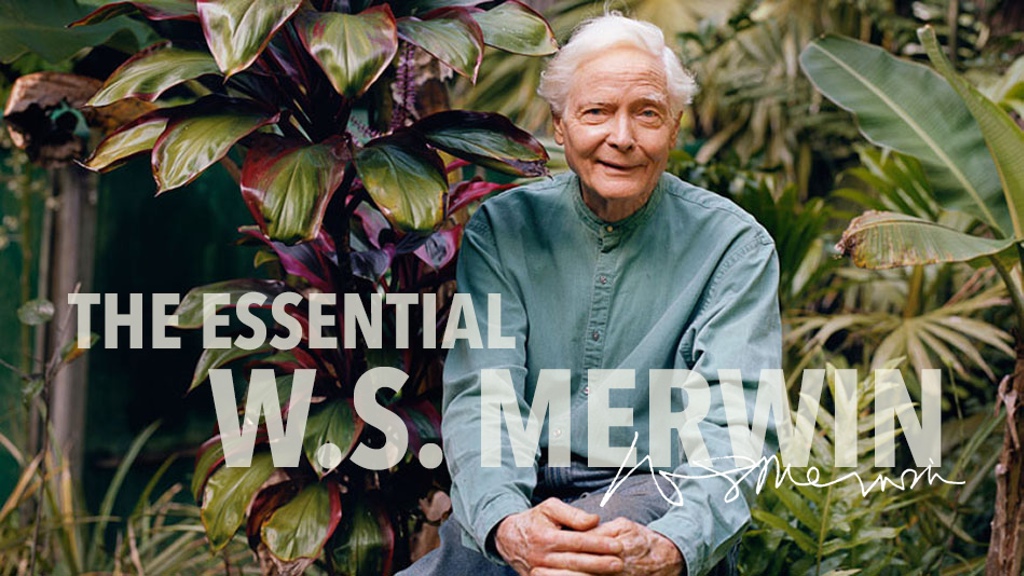
What's the project this week?
The Essential W.S. Merwin. We've put $20 in as a non-reward backer.
Who is the Creator?
What do they have to say about the project?
Help Copper Canyon Press publish the definitive collection of W.S. Merwin’s poetry.
What caught your eye?
This is the third Kickstarter from the one-and-only Copper Canyon Press. It's hard to overstate their importance in modern poetry, and how lucky we are that they are a Northwest institution — their reputation, and history of stellar work, raise us all.
Their first Kickstarter was for rare poems from a dead poet, the second (which we backed) was for new poets. Fitting, then, that the third is for a well-awarded poet still with us.
Perhaps you are not familiar with the Pulitzer (two of them!) winning, US Poet Laureate WS Merwin. Perhaps you know his work well and have followed him for years. But either way, backing this project to create a collection of his work will cement his work for years to come.
Why should I back it?
We always do our best to back local poets and publishers, so that's the first thing. Second is recognizing the history and accomplishments of a living poet whose work has had such depth and reach. Merwin deserves the kind of audience that a project like this can bring. Think about how many poets you've discovered through their collected or essential works?
How's the project doing?
28% there and 26 days to go. They're just getting started, now is a great time to grab a copy of the book for yourself.
Do they have a video?
Kickstarter Fund Stats
- Projects backed: 44
- Funds pledged: $880
- Funds collected: $700
- Unsuccessful pledges: 2
- Fund balance: $160
APRIL Festival to shut down after one big circus in 2017
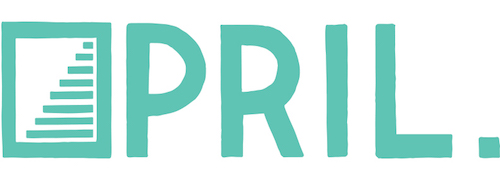
The organizers of the APRIL Festival just sent an email out with some bad news: next year will be the final APRIL. And the final APRIL will be an abbreviated, single-day serving. But boy does it sound like a lot of fun: on Saturday, April 1st, they will host “an all-star Poet, Playwright, Novelist and Drag Queen competition, readings from our favorite authors, a mini book expo and more under a literal circus tent at Hugo House.”
This is, of course, very sad. APRIL has hosted some of my very favorite literary events, including Seattle’s first literary crawl, a surprise fried chicken dinner, a séance, and so many more. In just five years, APRIL had become the much-needed first ray of light in the Seattle arts calendar after our long and gloomy winters. When APRIL time came around, everything seemed possible again: yes, people were willing to cram themselves into a house-turned-art-gallery, arm themselves with cheap beers, and listen to a poetry reading. Yes, hundreds of people would show up for a book festival made up of only small-press titles. Yes, it’s spring and it’s time to think about books.
But here’s the thing: not everything needs to last forever. And it’s not like the spirit behind APRIL is leaving Seattle. All the organizers of APRIL are pursuing their dreams, and they will all continue to be deeply involved in Seattle’s literary scene. Willie Fitzgerald is a Made at Hugo Fellow. Tara Atkinson’s first book of fiction is coming out soon. Frances Chiem is, happily, getting her writing out into the world more often. Sarah Baker edits Small Po[r]tions.
So yes, of course we will join them in their circus tent next year and get drunk and be really, really sad that we’re at the last APRIL Festival. We must do this, to honor the terrific times we had and the amazing community they created together. In the long history of literature in Seattle, there has never been anything quite like APRIL, and that is an achievement worth celebrating.
If you want to thank APRIL's organizers for all their hard work and volunteer for next year's last big show, they'll be running a booth at this Saturday's Short Run Comix & Arts Festival, where they'll be selling APRIL merchandise for cheap. Go support them and show your respect.
But we can’t be too sad about this for too long. Here’s the thing: if you’re very upset about APRIL going away, that means one thing and one thing only: It’s your turn to start a book festival. You have no excuses left. Trust me, the APRIL organizers didn’t have any cash when they started their festival. They used their imaginations to throw a bunch of unconventional events, and then they relied on their community to provide the resources and connections to make each successive APRIL better than the last. You, too, can do this. I’m sure APRIL’s organizers would be happy to sit down and talk with you about how they made it happen. I know that the Seattle Review of Books would love to help you get the word out about your crazy plans. You can do this. It’s up to you now.
The Help Desk: I'm writing a novel this month. Does anybody care?
Every Friday, Cienna Madrid offers solutions to life’s most vexing literary problems. Do you need a book recommendation to send your worst cousin on her birthday? Is it okay to read erotica on public transit? Cienna can help. Send your questions to advice@seattlereviewofbooks.com.
Dear Cienna,
I'm finally doing National Novel Writing Month this year. But I need your guidance on this one point: should I tell my friends I'm doing NaNoWriMo so they can offer moral support and shame me if I fail? Or should I not tell anyone I'm doing NaNoWriMo because I don't want to have to explain what my novel is about over and over again? The only thing worse than keeping a secret from my social circle is talking about fiction, which seems about as exciting as talking about my dreams, only possibly more embarrassing. Help me decide?
Dina, Bitter Lake
Dear Dina,
You are correct: Listening to any person talk in detail about the plot of their NaNoWriMo novel is on par, entertainment wise, with reading their dream journal. Or listening to them brag about their children. Or watching a snail take a shit.
But that doesn't mean you shouldn't tell your friends about your NaNoWriMo goals – you absolutely should. Here's how you build accountability for yourself while giving your friends a vested interest in your writing: promise that for every day this month that you fail to meet your word-count goal, you owe them one pitcher of beer. This will ensure they're checking in often to see how much beer you owe them.
Of course, it also means they will ask you about your novel because they are probably polite and undoubtedly adore you. If you're self-conscious talking about it, try crafting a one-sentence elevator pitch in advance that you can spit out and be done with.
Here are a few examples of my past (failed) NaNoWriMo efforts for inspiration:
- It's a coming-of-age story about spiders – like Charlotte's Web but more overtly sexual.
- It's about a man whose mother named him Fetus because she was a bitch.
- It's about a death-row psychopath who writes morality fables for children.
Kisses,
Cienna
Letter to the Editor: If laughing at Jack Chick is wrong, I don't wanna be right
We love to hear from our readers! Please send letters to the editor through our contact form.
I was disturbed to read Paul Constant’s editorial about Jack T. Chick. Much like Paul, I used the comics as a source of laughs. I use the word "disturbed" because the editorial points at a kind of revisionism that paints us, the kind of people that Jack T. maligned (a very broad category, I’ll admit), as being powerless subjects under him and our ironic consumption of his comics as acquiescence to his ideology.
The worst part about Jack T. Chick’s death is finding out that we can’t laugh at and mock bigotry anymore. It's finding out that hectoring morality and overweening earnestness are not the sole provenance of the Christian Right. It's finding out that irony and camp, which have saved countless lives, are unacceptable aesthetic categories.
Thanks,
Hi Matthew,
First of all, thanks for reading and for writing in. I very much appreciate your taking the time to read and respond to our site.
For the sake of readers who are coming in late, let me just clarify: I believe you’re referring specifically to my statement that when I reappraised Chick’s comics after his death, I found them to be ”not fun anymore.” And I also said that when I collected them back in the 1990s, it “was easy for me, as a young straight white male, to enjoy Chick’s comics.”
This is something that’s been on my mind a lot, lately: I’m part of a generation — I guess it’s the tail end of Generation X — that was known for its over-exaggerated sense of irony. Like many people in my peer group, I liked a lot of pop culture in my youth specifically because it was so bad it’s good. If you were to ask me when I was 22 whether I liked Elvis because of the kitsch factor or because I genuinely liked Elvis’s music, I don’t know if I could have honestly told you. (Now, for the record, let me say that I definitely like his music, though maybe I was initially attracted to Elvis because of the kitschy trappings.)
I think one of the more damning legacies of my generation is that we never collectively moved past irony into a more meaningful cultural conversation. Millennials, as far as I’m concerned, have much more sophisticated interactions with culture than people my age ever did in their 20s. Scoffing was always the default cultural response for people my age, and I spend a lot of time wondering how many opportunities we passed up because we were too afraid of being scoffed at.
Not to date myself too much, but let me pull another example from my early 20s: Wesley Willis.
Wesley Willis was an “outsider” musician who created atonal, repetitious music, and a lot of people my age went crazy for him in the late 1990s. They bought his albums, went to his concerts, and proudly displayed his art in their homes. I was always uncomfortable with Wesley Willis fandom because I could never tell if people were laughing at him or laughing with him. Some might accuse me of being overly critical, but I think the idea of a theater full of relatively wealthy white kids gathered to see a schizophrenic African-American man is a culturally freighted event, and to me, it demands a little investigation. Are they mocking Wesley Willis? Do they genuinely enjoy him? Does their mockery matter, if it supports him financially as an artist?
It’s not the same as Wesley Willis, but Jack Chick also carries a charged dynamic. When I was laughing at Jack Chick strips, I was literally laughing at someone else’s hatred. Meeting hate with laughter seems like a good and decent response, but the hate was not, strictly speaking, aimed at me. It was safe for me to laugh at the hate, because I wasn’t the target. Of course, I know gay men who loved and collected Chick tracts, and so I’m not saying it’s impossible for the targets of Chick’s ire to find him amusing, and I wouldn’t dream of judging the way my gay friends laugh at Jack Chick.
It is all very complicated.
Of course humor is an intensely complicated thing, and it’s impossible to draw moral lines around why we find something funny. But I often think about this paragraph from a TIME profile of Dave Chappelle that explains why he ended The Chappelle Show:
The third season hit a big speed bump in November 2004. He was taping a sketch about magic pixies that embody stereotypes about the races. The black pixie — played by Chappelle — wears blackface and tries to convince blacks to act in stereotypical ways. Chappelle thought the sketch was funny, the kind of thing his friends would laugh at. But at the taping, one spectator, a white man, laughed particularly loud and long. His laughter struck Chappelle as wrong, and he wondered if the new season of his show had gone from sending up stereotypes to merely reinforcing them. "When he laughed, it made me uncomfortable," says Chappelle. "As a matter of fact, that was the last thing I shot before I told myself I gotta take f_— time out after this. Because my head almost exploded."
I absolutely believe Chappelle: there are many different ways to respond to a racially charged joke, and not all of them are positive. Not all humor is constructive; in fact, plenty of humor is actively destructive. Was Chappelle right to deny the world new seasons of his show because he was worried about how some people would receive it? It doesn’t matter what I think; he’s the artist and so his choice is what matters.
Am I saying that we should ban destructive humor? Of course not. Laughter is speech and speech should be free. But as far as I’m concerned a little more inspection of why we find things funny isn’t a bad thing. (And sure, you can kill a joke by examining it too closely. But the wonderful thing about life is that humor is everywhere and even at the darkest moments in history new funny things are happening all the time. Comedy is an eminently renewable resource, and so dissecting a joke or two won’t rob the world of any opportunities for laughter.)
Of course, the biggest example of this complicated-laughter phenomenon right now is Donald Trump. In the early days of the Republican campaign, in the late summer of 2015, everyone treated Donald Trump like he was a joke. I think if we were smarter about the way we laughed back then — if we laughed at him, rather than with him — we might not be in the disgusting situation we find ourselves in right now. And I’m not saying that I don’t find humor in the things Donald Trump says anymore; my Twitter feed is pretty much 90% gallows humor about Donald Trump these days, and without that comedy I sometimes don’t know how I’d get through the day. But the quality of laughter has changed as the severity of the situation has changed.
And so that’s what I meant about Jack Chick: it’s not as easy for me to laugh at his comics, now that I’m not in an enclave of ironic young white people, now that I know a lot of wonderful same-sex married couples who Chick considered to be subhuman, now that I routinely listen to the voices of women he would relegate to second-class citizens. The stakes, for me, have changed as I’ve aged and become a citizen of the world and met more people and learned about more experiences. At the time, I was a sheltered young man who surrounded myself with homogeneity; I think that in some respects there was a part of me that was laughing with Chick back in those days, not at him, and that realization makes me deeply uncomfortable.
So, finally, back to your letter: let’s be clear, I’m not saying that the people Chick maligned are “powerless.” But I am saying that I, as someone who enjoys a great deal of privilege from Chick’s perspective, feel strange about blithely being entertained by his comics. I’m not saying that you “can’t laugh at and mock bigotry anymore.” I am all for laughing at and mocking bigotry; I do a fair amount of it on Twitter most days. But I’m also interested in doing so responsibly, and examining the idea of what responsible mockery might be.
In the end, I don’t think we’re at odds, here, Matthew. I’m not calling anyone else’s behavior “unacceptable,” or “hectoring” anyone. You are free to laugh however you choose; I promise I’m not going to take away your right to laughter. The reason I used my own experience in the review isn’t because I’m a raging narcissist — well, it’s not just because I’m a raging narcissist. I did that because I wasn’t comfortable judging other people for the way they consumed Chick’s comics. If my piece somehow sapped your enjoyment of Chick’s comics, I apologize. But I also think that opens up an opportunity for you to ask why your enjoyment was so easily derailed. A good joke can survive investigation; in fact, intelligent comedy blossoms and reveals hidden layers under scrutiny.
So in the spirit of all this — comedy, Trump, hate, ignorance, introspection — I want to share the single best piece of comedy writing I think I’ve seen this year, a sketch that uncovers, investigates, and mocks some of America’s greatest problems in such a way that everyone is invited to laugh. This is what good comedy can do:
Sorry to talk your ear off.
Thanks again for writing in!
Paul
Portrait Gallery: Alexander Chee
Each week, Christine Marie Larsen creates a new portrait of an author for us. Have any favorites you’d love to see immortalized? Let us know

Friday November 4th:
Hugo Literary Series: Animals
With its big bar and swanky chandelier, Fred Wildlife Refuge is a terrific temporary home for Hugo House’s Literary Series. Readers include short story author Kirstin Valdez Quade, novelist Alexander Chee, and Seattle’s own Mattilda Bernstein Sycamore, along with The Royal Oui, all producing new work around the theme of “animals.”
Fred Wildlife Refuge, 128 Belmont Ave. E., 322-7030. http://www.hugohouse.org. $10-25. All ages. 7:30 p.m
Get painted by Christine!
Christine is taking on a limited amount of commissioned portraits, in her Seattle Review of Books style, in advance of the holidays. If you want a portrait of a friend, loved one, pet, or even yourself (immortalize your bossest selfie!) for your own wall, or as the most thoughtful gift you can possibly imagine, then please do reach out. There's more information on her website.
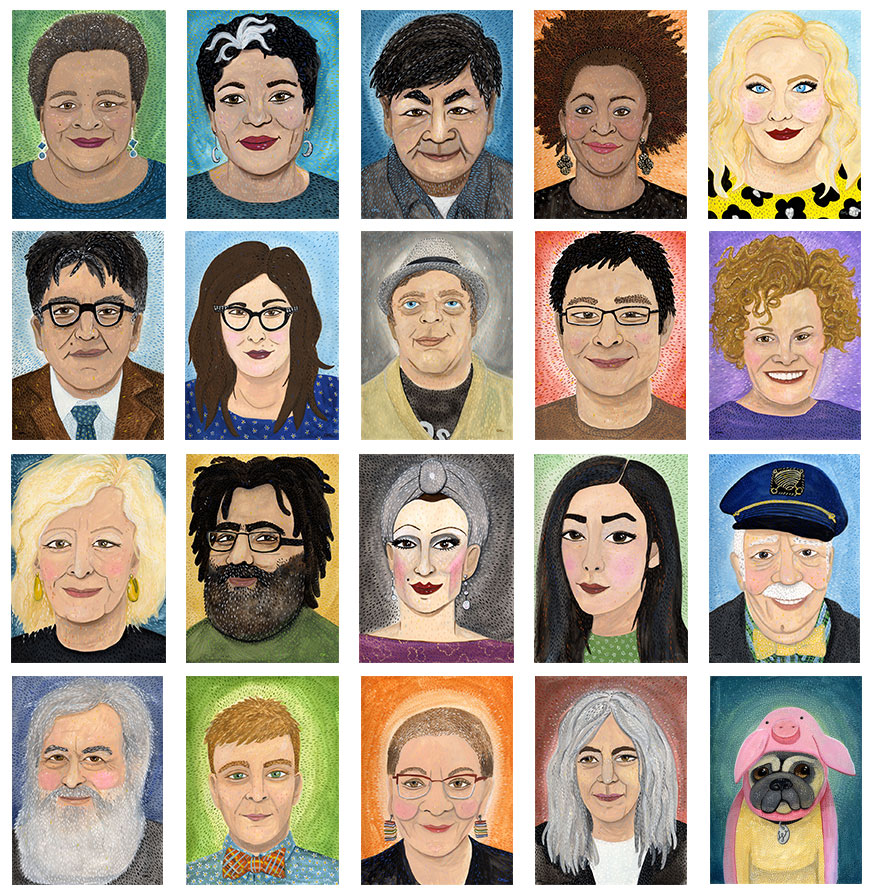
Can the Intruder community remain as Thick as Thieves?
Tonight, as part of First Thursday Art Walk, the Brainfreeze art gallery — where the Lusty Lady used to be, across from the Seattle Art Museum on 1st Avenue, downtown — is hosting a launch party for a brand-new free publication that’s trying to fill the gap left by the sadly defunct Intruder anthology comic. The debut issue of the new free quarterly comic Thick as Thieves looks almost exactly like an issue of Intruder, save for the fact that it’s only 8 pages rather than 16. The similarities with Intruder makes sense, as it was published at the same place (Pacific Publishing) and cofounder Simon Lazarus Vasta has told me he considers Intruder to be an influence.
The comics in Thick as Thieves are a little wordier than many of the Intruder comics, which tended more toward the art side of the comics equation. The best three comics in the issue are right in front. Lara Kaminoff’s reimagining of “The Love Song of J. Alfred Prufrock” as a poem written by a day old doughnut (“I grow stale, I grow stale/My dry dough begins to pale”) is clever and adorable and pretty to look at with its expressive doughnut main character and its vibrant lettering. Whitney Stephens’ “Don’t Mutilate My Mink” is a strip about revenge: when a woman on the street insults the protagonists’ mink stole, she imagines calling the woman out on her fashion hypocrisies. (“Nice slave labor sneakers.”) And Marie Haushauer tells a short, cruel, funny story about an older woman trying to seduce a young man, with disastrous results.
Over time, of course, Thick as Thieves will naturally continue to separate itself from Intruder’s legacy, but for now it feels like a loving tribute to a publication that served as a community center. I wouldn’t expect the entire Intruder community to cluster around Thick as Thieves, of course, and that’s part of the appeal. There’s no shame in building on the backs of what others have built, as long as you’re honest about your influences and you're willing to let it become its own thing.
Thursday Comics Hangover: Doctor Strange could be a little more strange
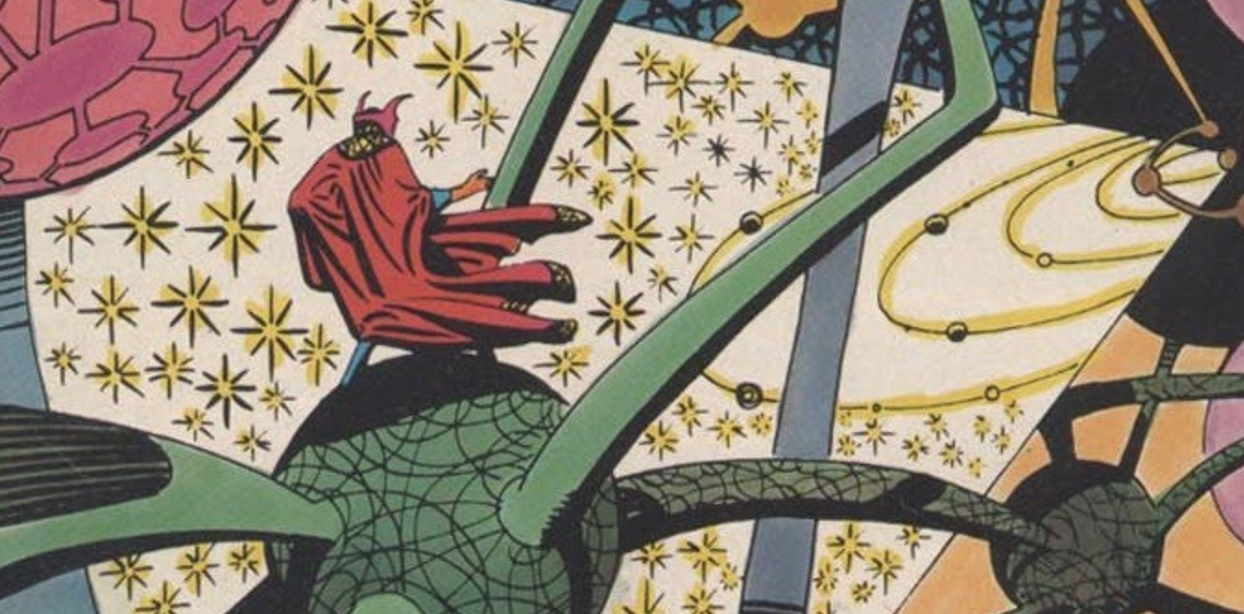
Yesterday was comics artist Steve Ditko’s 89th birthday, which made it an especially fitting day to watch a preview screening of Doctor Strange. Ditko was the co-creator of the Doctor Strange character, and those early comics, published in Strange Tales in the mid-1960s, were probably the purest example of Ditko’s imagination ever put to paper. Strange frequently ventured to realms where giant creatures made of spikes would crawl out of pools of liquid floating in thin air, or where thick bands of ink formed protective barriers that would keep astral forms — essentially, the souls of humans — trapped away from their bodies.
The great thing about Ditko’s illustrations of magic in Doctor Strange comics is that they were basically marginalia pulled into the story — an artist’s mindless doodles given weight and narrative meaning. They were creative id made real. And in many ways, the special effects in Doctor Strange serve the same purpose as Ditko’s illustrations. In a few instances — particularly the multicolored sphere-and-rod molecular structures of the Dark Dimensions — they look exactly like Ditko art made three-dimensional. But in every instance, the special effects aren’t intended to look realistic: they’re concepts, digital doodlings, attempts to make bizarre concepts real.
The pulpy psychedelia of the early Doctor Strange comics are served well by the effects in the Doctor Strange film. A series of fractal hands and bizarre facial contortions early on, especially, capture the stoner vibe of Ditko’s art. And even the bits that feel familiar — you’ve likely seen the kaleidoscopic cityscapes in the trailers for the film, which feel like direct lifts from the iconic city-bending scenes in Inception — still take the source material to bizarre new lengths. Speaking as someone who has been thoroughly disappointed with just about every blockbuster film this year, it turns out that digital effects can be incredible when you don’t obsess over realism. This is a movie to watch on as big a screen as possible, and IMAX 3D is recommended. Your eyes will be happily exhausted trying to take it all in.
But it’s a shame that when Doctor Strange isn’t aping Ditko’s visual style, it’s mostly a very conventional superhero origin story. The origin that Stan Lee and Steve Ditko took eight pages to tell in Strange Tales #115 is stretched out to two hours here, and the Marvel film house style is basically in full effect. The score is unmemorable, a black sidekick character with similar powers accompanies the white male hero while still staying firmly in a supporting position (Chiwetel Ejiofor has almost never felt so wasted as he does in Doctor Strange), and the villain (Mads Mikkelsen) doesn’t get to demonstrate an interior life. Further, the story stops dead for massive exposition dumps on a regular basis, and given that the magic in Doctor Strange involves lots of chatter about spirits and the meaning of life, the effect can be similar to attending an overeager new-agey church for the first time.
That said, Benedict Cumberbatch is a fine and charismatic lead who does pretty well with the American accent and the same “overconfident jerk learns humility” arc that Iron Man and Thor and Chris Pratt's Starlord in Guardians of the Galaxy followed. Rachel McAdams and Benedict Wong don’t have much to do in supporting roles, but they excel with what they’re given. In an unfortunately whitewashed role as the guru who shows Strange the ways of magic, Tilda Swinton elevates the film whenever she’s on screen.
Is Doctor Strange worth your time? I’d say absolutely, if just because it’s a delight to watch a blockbuster that finds inventive uses for CGI, rather than just rendering an endless array of explosions. It’s a likable, enthusiastic superhero movie, with all the baggage and all the entertainment that description entails.
But is Doctor Strange worthy of Steve Ditko’s art? On the whole, I’d have to say no. While the effects are marvelous, Doctor Strange fails to capture a particular alienated bitterness that almost always figures into Ditko’s work. His Strange was a wary, weird figure who didn’t connect well with normal humans. Instead, he sulked around his Greenwich Village home, wandered through weird dimensions, and spent lots of time with his head buried in books. While the look of the film is dead on, Doctor Strange could use more of Ditko’s characteristic misanthropy to distinguish the character’s otherness from the alpha-male heroes who have already come before. This Doctor Strange is not strange enough by half.
Doctor Strange opens in theaters all over Seattle tonight.
Book News Roundup: It's time to get to know Ted Chiang
- Seattle-area writer Ted Chiang has long been one of the local sci-fi community's best-kept secrets. Just about every Seattle sci-fi writer worth their salt counts Chiang as one of their favorite writers, but his work has not garnered larger acclaim. That's all about to change: one of Chiang's short stories is about to be adapted into an upcoming film called Arrival starring Amy Adams that is attracting a lot of pre-release buzz.The Wall Street Journal published a great little profile of Chiang yesterday that you should read.
“He’s got a really good mix of humanity and science, unlike some writers,” said Ellen Datlow, the editor who acquired “Tower of Babylon,” the first story of Mr. Chiang’s to be published, for Omni magazine in 1990.
While we're talking about Seattle-area writers, Electric Lit published a long interview with Elissa Washuta that you should read.
So this is kind of creepy: according to GeekWire, at Amazon's brick-and-mortar bookstore, you're apparently only able to buy books on discount if you're an Amazon Prime customer. If you're not on Prime, you pay full list price.
Greta Van Susteren has a bad opinion about the cost of colleges. Rather than cutting the ridiculously expensive stadiums or coaches' salaries, she seems to think libraries are making colleges too damn expensive:
Colleges should stop building vanity projects like huge libraries and billing students-full libraries are on our smartphones! https://t.co/QBeVKZvIKZ
— Greta Van Susteren (@greta) October 31, 2016
- On that last item, let's be clear: books are an investment in education, and they are non-negotiable. In fact, eliminating library books from a college would disproportionately harm low-income students who might not have the technology needed for ebooks. This is clearly an idea that was not at all thought through.
Your Week in Readings: The best literary events from November 2 - November 8
Wednesday November 2: Short Run International Comix Night
In just a few years, Seattle’s own Short Run Comix & Arts Festival has gone from a zine show packed into the Vera Project to an international affair. Tonight, Short Run brings four worldly cartoonists — from Lebanon, Greece, Belgium, Mexico, and Croatia — to the downtown library to discuss the universal language of comics. Seattle Public Library, 1000 4th Ave., 386-4636, http://spl.org. Free. All ages. 7 p.m.Thursday November 3rd: Poets! A Dynamic Group Reading
What a stellar lineup of poets: Amaranth Borsuk, Don Mee Choi, Jennifer Kronovet, Sarah Mangold, Sarah Rosenthal, and Jane Wong. All these authors have published new work recently, and Choi is also hard at work translating Korean poets into English. If you haven’t fallen in love with a new poet this year, this reading will do the trick. Elliott Bay Book Company, 1521 10th Ave, 624-6600, http://elliottbaybook.com . Free. All ages. 7 p.m.Friday November 4th: Hugo Literary Series: Animals
With its big bar and swanky chandelier, Fred Wildlife Refuge is a terrific temporary home for Hugo House’s Literary Series. Tonight’s readers include short story author Kirstin Valdez Quade, novelist Alexander Chee, and Seattle’s own Mattilda Bernstein Sycamore, along with The Royal Oui, all producing new work around the theme of “animals.” Fred Wildlife Refuge, 128 Belmont Ave. E., 322-7030. http://www.hugohouse.org. $10-25. All ages. 7:30 p.mSaturday November 5th: Short Run Comix & Arts Festival
See our Literary Event of the Week column for more details. Fisher Pavillion, Seattle Center. http://shortrun.org. Free. All ages. 11 a.m.Sunday November 6th: The Cascadia Poetry Festival
It’s a big weekend for Seattle festivals. Yesterday saw the Short Run Comix & Arts Festival, and the Cascadia Poetry Festival has been happening all weekend long at the Spring Street Center. This off-campus reading features three titans of Cascadian poetry: Sam Hamill, Brenda Hillman, and Colleen McElroy. Open Books, 2414 N. 45th St., 633-0811, openpoetrybooks.com. Free. All ages. 4 p.m.Monday November 7th: Hood: Trailblazer of the Genomics Age Reading
The next few years are likely going to do for biology what the late 1990s did for the internet. And we owe it all to Lee Hood, the biologist who led the charge to sequence the genome. Journalist Luke Timmerman reads from his new biography of Hood, which includes never-before-seen files and memories of the man. University Book Store, 4326 University Way N.E., 634-3400, http://www2.bookstore.washington.edu/. Free. All ages. 7 p.m.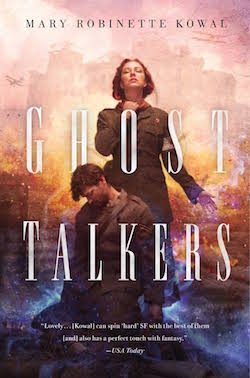
Tuesday November 8th: Ghost Talkers Reading
You don’t get to do anything tonight unless you’ve already voted. Sorry, it’s the rules. But if you’ve voted and you want to do something besides be anxious while waiting for returns, why not attend a reading by sci-fi author Mary Robinette Kowal, who’ll read from her new novel about a ghost army in World War I? University Book Store, 4326 University Way N.E., 634-3400, http://www2.bookstore.washington.edu/. Free. All ages. 7 p.m.Literary Events of the Week: Short Run and the Cascadia Poetry Festival
It’s an overwhelming year. We’re all overwhelmed by the presidential election, we’ve been overwhelmed by the continual cycle of cool celebrities dying and the swarm of overwrought tributes to said deceased cool celebrities that flood our social media feeds, and Seattle’s incredible growth — and attendant anxieties — has been impossibly overwhelming all year long. In fact, everything has been overwhelming for so long that we’ve forgotten what it is to feel whelmed.
Here’s where you’re probably hoping I’ll explain that we’re in for a rare quiet week in the literary arts, with one big reading and some small, quieter group readings filing out a pastoral moment in the Seattle literary community. Ha, ha — nope! Prepare to be overwhelmed again, motherfuckers!
Seattle is host to not just one but two literary-minded festivals this week. The Spring Street Center hosts the latest edition of the Cascadia Poetry Festival (http://cascadiapoetryfestival.org), in which poets gather to discuss what, exactly, a Cascadian tradition of poetry means. Poets are pouring in from all over the region to take part in this, and it’s one of the few artistic celebrations of the region that doesn’t ignore the politics of what it means to be Cascadian.
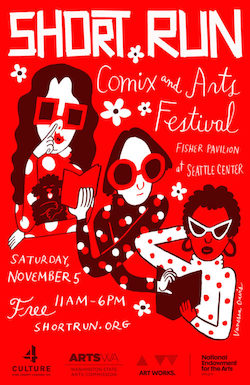
And all week long, cartoonists and small press folks are celebrating the Short Run Comix & Arts Festival {http://shortrun.org) at (mostly free) events around town. The week kicks off with four international cartoonists on the 2nd at the Central Library—see the calendar for more details—and then on the 3rd, Mexican cartoonist Inés Estrada is hosting a bilingual cartooning workshop for kids at the South Park branch of the library. On the 4th, Fantagraphics Bookstore and Gallery is hosting an art show, a special preview of cartooning maestro Dash Shaw’s upcoming animated feature film, and a reading from local comics rock star Tom Van Deusen.
But that’s all just preamble for the big show: the sixth annual Short Run Festival on Saturday the 5th, from 11 am to 6 pm at the Fisher Pavillion at Seattle Center. Nearly 300 artists from around the world will be showing their work in one of the fastest-growing festivals of its kind. Part of the thrill of Short Run is in how overwhelming it is: you just walk in, wander around, and see what speaks to you: last year, I was blown away by work from Seattle paper-craft cartoonist Mita Mahato, Robyn Jordan’s #shoutyourabortion-themed minicomic, and the weirdly beautiful comic series Coin-Op out of California.
Because wandering the floor can be, yes, overwhelming, Short Run’s programmers have set up various sideshows, including a speed painter, animation shows, a community coloring project, and a comic called Arctic Circle that foregoes the visual to tell its stories through the sense of touch. And if that’s not enough for you, there’s also an afterparty at Washington Hall featuring musical acts DoNormaal, Nail Polish, DJ Green Thumb, and Hatem Imam, for a wildly reasonable cover price of $7. So go ahead and be overwhelmed: maybe you can get some sleep next week.
On November 5th and 6th, Third Place Books is having their semi-annual used book sale. Every used book at all three Third Place locations will be 40 percent off. And they're trying something new this time around: if you visit and spend at least $5 at each location, you'll get a $10 gift card. It's going to be a long winter, and this is a great way to stock up your nightstand.
He who should not be named
Published November 01, 2016, at 12:01pm
Can any book truly capture the fact-free horror that is Donald Trump?
Kishotenketsu for Mars
On Mars, water once flowed. Where
did it go? Some froze, but scientistssuspect a cosmic cue ball — a comet
etc. — knocked Mars so hardthe planet escaped
its own atmosphere, justleft it there, jumped its own skin
like an anime catleaving his pajamas spread-eagle
in space. And now, goddammit,David Bowie is dead.
I worshipped him like a flowertwists its dewy face to the brightest,
prettiest star. He asked us,decades down, “Is there life on Mars?”
Once, perhaps. There once was lifein Bowie too. Stars glitter,
planets don’t —an atmospheric parlor trick,
but neither titan ceasesto exist just because
a little air escaped.
Stories from north of our north
Sponsor University of Washington Press has given us permission to run an excerpt from Ernestine Hayes' The Tao of Raven. Make sure you visit our sponsor's page to read it.
Hayes, a native Alaskan living in Juneau, wrote about returning to Alaska in her first book, Blonde Indian. This book, part memoir, part cultural exploration, tunrs Hayes' unique voice to other stories, like completing college in her fifties and becoming a professor and writer. We think you'll love the excerpt, and hope it will get you excited to read more.
Sponsors like the University of Washington Press make the Seattle Review of Books possible. Did you know you could sponsor us, as well? Get your stories, or novel, or event in front of our passionate audience. There are some dates open perfect for pitching your product for the holidays. Take a glance at our sponsorship information page for dates and details.
Book News Roundup: Ask us about our feminist agenda
This is a neat idea: Alexander Chee is taking over the Hugo House's Instagram feed this week to provide teasers of the story he'll be reading at the House's Literary Series event this Friday.
Happy Halloween! This has to be the best literary Halloween tweet of the year:
I just passed a young woman wearing a sombrero, would be so dope if her costume was "lionel shriver"
— Rumaan Alam (@Rumaan) October 31, 2016
Emily St. John Mandel wrote a great piece on Five Thirty Eight about the current craze of books with the word "Girl" in the title. It's packed with charts about the age of the supposed "girls" in the title — they're mostly women — and the mortality rates of the titular girls.
This essay by Tiffany Martínez deserves more attention. Why would a college professor tell a student — any student — that they're not allowed to use a word?
On the second page the professor circled the word “hence” and wrote in between the typed lines “This is not your word.” The word “not” was underlined. Twice. My professor assumed someone like me would never use language like that. As I stood in the front of the class while a professor challenged my intelligence I could just imagine them reading my paper in their home thinking could someone like her write something like this?
- The one and a half million people who live in the Bronx will soon no longer have a general interest bookstore of their own. The last bookstore in the Bronx — a Barnes & Noble — will be closing soon.
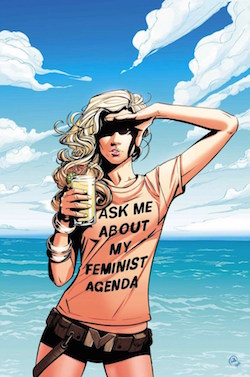
- I've written twice about how much I enjoyed novelist Chelsea Cain's Mockingbird series. Last week, Cain was chased off Twitter by comic book fans who disliked the fact that a cover of the last issue of the series featured Mockinbird wearing a t-shirt that read "ASK ME ABOUT MY FEMINIST AGENDA." Heidi MacDonald at the Beat wrote a good piece about the story. And of course, those idiot trolls shot themselves in the foot: the first collected volume of Cain's Mockingbird series is now a bestseller. Comics fans who align themselves on anti-diversity crusades are on the wrong side of history. The future of comics is female and diverse. We side with Cain and with the feminist agenda.
Talking with Ebo Barton about representing Seattle, the divide between spoken word and written poetry, and three poets you should know
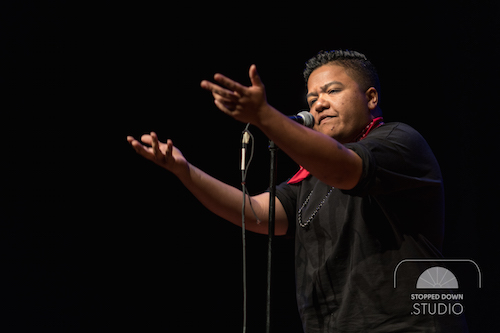
(Photo of Ebo Barton by Adam Rubinstein of Stopped Down Studio.) Earlier this month, Seattle poet Ebo Barton took fifth place at the Individual World Poetry Slam in Flagstaff Arizona. We talked with them over email about the championship and the state of poetry in Seattle right now.
Could you tell our readers what the process of getting to the Individual World Poetry Slam was like? How did you wind up delivering spoken word to an audience of people in Flagstaf?
The local process is, honestly, the most fun. Seattle Poetry Slam hosts preliminary slams in which Seattle poets compete using poems with a 4-minute, 3-minute, 2-minute and 1-minute time limit (with a 10 second grace period), much like they do at the Individual World Poetry Slam preliminaries. The top 8 poets then go on to final competition and first place gets to represent Seattle. In these slams, I get to compete with my friends and poetry family. It's not as intense as it sounds because really the core of Seattle Poetry Slam has been the community. We love each other, we've been through life together, we talk on a regular basis about experience with oppression, how the system continues to hunt us and we laugh together. I would be just as happy to see any other poet from Seattle Poetry Slam get to the final stage in Flagstaff. The competition aspect has helped me grow as a writer and a tool to grow my art skills, but I don't let the competition own me or my work. I was fortunate enough to win a preliminary slam and then win the finals, which led to being sent to Flagstaff, Arizona as a Seattle Poetry Slam representative.
You've won and been a finalist at many slams for almost the last ten years. What do you think about your work appeals most to judges? What's your greatest strength a performing poet?
I’m a Queer, Person of Color who was born female so I’m not used to espousing my strengths or even hearing about them. I had to ask my mentor about this. She allowed me to realize that my story is the story that doesn’t often get told. My story is often the one that is silenced or erased from history. I’ve taken it upon myself to use the time limits in which I’m given to be on stage to tell the story in my voice. From the poor, Black, Filipino, Queer, Trans, masculine, undereducated, child of an immigrant mother, sexual assault survivor’s voice. People find themselves in those stories. I think my greatest strength, (again, internalized oppression is real and this difficult to question to answer) is staying true to my story and remembering why I wrote it. For all the parts of me I wrote the poem.
Do you think the spoken word community and the poets who tend more toward written poetry could learn something from each other? Do you think Seattle's poetry community is divided?
THANK YOU FOR ASKING THIS! YES! I wish so much that written poets and spoken word poets would connect more. I do have to acknowledge that written and spoken word are often separated by race and class. Spoken word and slam tend to often involve folks that have little access to academic or higher education. You can come in from anywhere and put your name in the bucket and get on the mic. Spoken word is the ways in which most people of color share their histories. I think something that doesn’t often get said is that written word is a tool of White Supremacy. “If it is not written/printed in a particular way, it does not exist” is the lie we are fed, as though we are not able to value the other ways in which stories are told or information is shared. But I do believe that there is something to learn on both ends. We are so similar, though, page poets often think about how the space on the page or between words and thoughts and in spoken word we often think about the space in our rhythms or even the literal space we take up on stage. And also, poetry slam gets looked down upon in a lot of communities and the thing is, at least our competition is upfront. There is a lot of competition in the written word, but it's not as upfront. Yes, I do believe Seattle's poetry community is divided. I think we definitely try to make an effort, but again, our art forms are often separated by race and class and the gaps these things create take a concerted effort to bridge.
Who are three Seattle-area poets who you think are doing amazing work right now?
Imani Sims, whose book (A)live Heart just came out via Sibling Rivalry Press. She is someone whose work I admire and love and speaking of page/stage is one of the rare poets that does both so beautifully. Troy Osaki, who is a phenomenal spoken word artist who is true to his roots in community work and political/cultural resistance. You may have seen his latest video on Bruce Lee's Facebook page or Buzzfeed taking on stereotypes and racism. I definitely strive to have the strength he delivers in his work. Tara Hardy, whose book, My, My, My, My, My is being published via Write Bloody Press. Tara tells her not-often-told story from so many different angles, it’s a lot to take in, but you want to so badly.
What's next for you? Where can our readers find you next?
I want to continue doing youth work as a teaching artist because it makes me the happiest. By day, I’m the Youth Arts Coordinator at Gay City. I am writing a Queer Social Justice Play which debuts at Gay City in May 2017. I'm planning a really interesting project with local comix artist Sarah Rosenblatt about our experiences using her visual art and my poetry. I am going on a West Coast tour in June 2017 and hopefully the Northeast in July 2017. The best place to find me is every Tuesday at Seattle Poetry Slam at Re-Bar (1114 Howell Street, 21+, $5, 7pm).
The Sunday Post for October 30, 2016
Undercover with a border militia
A long, intense, and detailed look at the types of people who join militias, and the sorts of things they do inside. More investigative reporting like this, please.
Becoming a militia member began with opening a new Facebook account. I used my real name, but the only personal information I divulged on my profile was that I was married and that I had held jobs as a welder and a prison guard for the Corrections Corporation of America. A "Don't Tread on Me" flag was my avatar. I found and "liked" militia pages: Three Percenter Nation, Patriotic Warriors, Arizona State Militia. Then Facebook generated endless suggestions of other militia pages, and I "liked" those too. To keep my page active, I shared other people's posts: blogs about President Barack Obama trying to declare martial law, and threats of Syrians crossing the border. I posted memes about American flags and police lives mattering. Then I sent dozens of friend requests to people who belonged to militia-related Facebook groups. Some were suspicious of me: "Kinda have a veg profile, so I got to ask why you want to be my friend????" one messaged. Many, however, accepted my friend requests automatically. Within a couple of days, I had more than 100 friends, and virtually any militia member who looked at my page would likely find that we had at least one friend in common.
Caminata Nocturna: The Border Crossing Experience
Meanwhile, on the other side of the border, Mexicans and tourists can pay a modest fee to find out just what it is like for people attempting to cross the border going North. This long comic is great storytelling, and how fascinating and unreal that you can just pay to find out how badly poor and desperate people are treated.

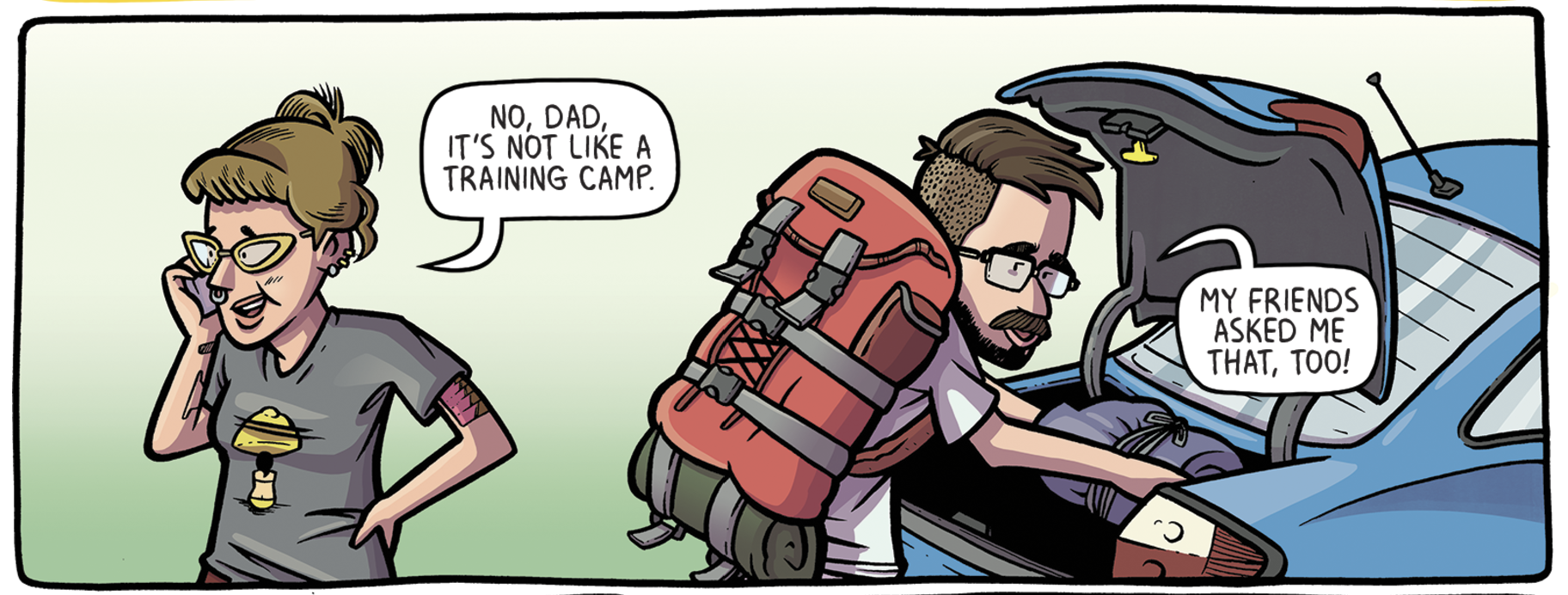
Scientists Just Proved That “Patient Zero” Did Not Bring HIV To The US
Amazing that the term "Patient Zero" was actually "Patient [letter] O", and due to internal CDC miscommunication, a meme and term was made.
The paper is a technical feat, but also has a powerful human side: It definitively clears the name of “Patient Zero,” a gay French-Canadian flight attendant named Gaëtan Dugas who for decades has been accused of bringing the virus to North America.
Dugas was hired by Air Canada in 1974, and his job took him to dozens of cities across North America. In 1980, he was diagnosed with skin cancer, just a year before the Centers for Disease Control flagged a mysterious cluster of infectious diseases in five young and previously healthy gay men in Los Angeles.
…
Dugas, known simply as Patient “O” (for “Outside of California”) in the CDC papers, was near the center of the cluster. A mistake in CDC communications, however, labeled him as Patient “0.”
Milk Chocolate Is Better Than Dark, the End
I will always stand proud next to those of you who stand proud for milk chocolate.
I generally enjoy milk chocolate, for basic reasons of flavor and texture. For roughly the same reasons, I generally do not enjoy dark chocolate.
Those are just my boring preferences, but preferences, really, won’t do: This is an age in which even the simplest element of taste will become a matter of partisanship and identity and social-Darwinian hierarchy; in which all things must be argued and then ranked; in which even the word “basic” has come to suggest searing moral judgment. So IPAs are not just extra-hoppy beers, but also declarations of masculinity and “palatal machismo.” The colors you see in the dress are not the result of light playing upon the human eye, but rather of deep epistemological divides among the world’s many eye-owners. Cake versus pie, boxers versus briefs, Democrat versus Republican, pea guac versus actual guac, are hot dogs sandwiches … It is the best of times, it is the RAGING DUMPSTER FIRE of times.


